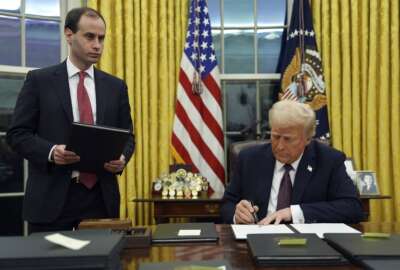In Depth Show Blog – Aug. 5, 2013
On the In Depth show blog, you can listen to our interviews, find more information about the guests on the show each day, as well as links to other stories and...
This is the In Depth show blog. Here you can listen to our interviews, find more information about the guests on the show each day, as well as links to other stories and resources we discuss.
Today’s guests:
Today we’re listening to the nomination hearing for Gen. Martin Dempsey and Adm. James Winnefeld. Last week the Senate confirmed Gen. Dempsey for his second term as the Chairman of the Joint Chiefs of Staff. Adm. Winnefeld is also confirmed for his second term as the Vice Chairman of the Joint Chiefs. On July 18, they testified before the Senate Armed Services Committee. In their testimony, the lay out their plans to deal with sequestration and maintain military readiness for all the branches serving around the world. In his opening statement before the Senate Committee Gen. Dempsey lays out a plan of action for both the Pentagon an Congress. He says his own personal duties start with a singular purpose.

Assistant Inspector General for Audits & Inspections
Special Inspector General for Afghanistan Reconstruction
A $200 million program at the U.S. Agency for International Development is supposed to improve security and help stabilize the Afghan government. But USAID has spent $47 million of the money and so far it can’t show progress toward either of the mission goals.

Senior Vice President
ICF International
The idea that people are your agency’s most important resource is nothing new. So cutting training and travel costs when budgets get tight seems counterintuitive. Jeff Neal, the senior vice president of ICF International and former chief human capital officer of the Homeland Security Department, has a list of top four ways to maintain your agency’s T and T budget.

Senior Correspondent
Federal News Radio
Conferences across the federal space are shrinking budgets and sequestration are pushing attendance numbers down. Federal News Radio Senior Correspondent Mike Causey is just back from the Federal Dispute Resolution conference in Orlando, and he says it was much smaller than usual.

Associate Director for Retirement Services
Office of Personnel Managment
The retirement backlog at the Office of Personnel Management isn’t getting worse, but it isn’t getting any better either. OPM is pushing back their timeline to deal with the retirement backlog. Ken Zawodny, OPM’s associate director for retirement services, says the change in plans is because of two things.

Director of Homeland Security and Justice Issues
Government Accountability Office
Chemical facilities are attractive targets for terrorists. The Homeland Security Department oversees safety regulations for high-risk facilities. But how DHS identifies risk is undermining its mission.

Senior Associate in the Labor & Employment Department
Seyfarth Shaw
A potential new federal hiring target for disabled employees could help them find more job opportunities with contracting companies. The new rule would affect more than 170,000 vendors, and some are formally protesting the idea.

Executive Editor
Federal News Radio
The Interior Department’s $1 billion cloud computing hosting contract is open for business. The Court of Federal Claims rules against a bid protest by CenturyLink.

Director of National Security Studies
Georgetown University Law Center
Filling the leadership vacuum at the Homeland Security Department won’t be easy, but maybe that’s a good challenge for the department. Before it starts plugging holes, DHS has an opportunity to consider what type of leaders it really needs.
More News:
- Presidential Nominations Sent to the Senate (White House)
- US military helicopter crashes in Okinawa
- Sequestration worsening the condition of Navy ships (Federal News Radio)
- Citing sequestration, OPM pushes back retirement processing goal (Federal News Radio)
- OPM’s efforts to shrink retirement backlog hit snag in July (Federal News Radiio)
- Pension, health care changes key to Senate postal reform plan (Federal News Radio)
Copyright © 2025 Federal News Network. All rights reserved. This website is not intended for users located within the European Economic Area.





